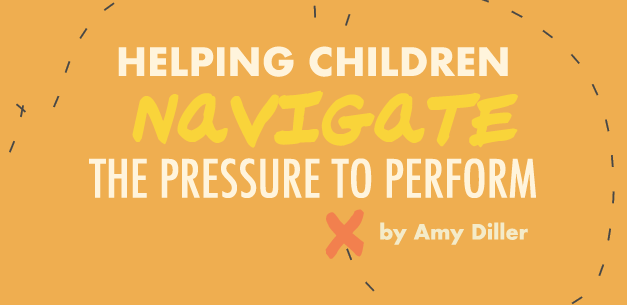Helping Children Navigate the Pressure to Perform
Years ago, I worked with first graders as a reading intervention teacher. I distinctly remember one student during end-of-the-year assessments. As I conducted the test, I could see the improvement in his skills as a reader, but the test score wasn’t “good enough.” He fell far short of the expected achievement for first grade, and he knew it. He burst into tears. He understood that the lack of measurable improvement meant he would need to repeat first grade. It broke my heart to see a child so young succumb to the weight of the pressure to perform.
Our kids are feeling an increasing amount of pressure in many different areas of their lives – school, sports, extracurriculars, etc. Culture tells us our worth lies in what we do instead of who we are, and our children internalize these messages. We are a society that stresses accomplishment over personhood. Our ‘doing’ receives more recognition than our ‘being.’ We praise kids for good grades, for winning a competition, for being the best at something, and we forget the importance of praise for who God made them to be. No teacher, coach, or parent sets out to place a heavy weight on kids, but it happens. It’s our job as parents to recognize when and why our children experience undue pressure.
The expectation for students to perform academically runs high. With administrators evaluated on teacher achievement and teachers evaluated on student achievement, it’s no wonder the push to succeed, whether voiced or not, begins as early as kindergarten. And it doesn’t let up. Young children are being asked to do things they aren’t yet ready for developmentally and expected to perform on standardized tests. Every year, the stakes get higher. This puts a tremendous amount of pressure on the shoulders of our kids.
Activities like sports, dance, scouts, and music lessons provide kids an opportunity to explore their natural talents and to learn new skills like teamwork and commitment. But they can also be a pressure point. We begin to hear kids comparing themselves to others in the group who seem to get the most praise or whose skills are more visible. Emphasizing skill over character qualities interferes with a child’s enjoyment of an activity. Coaches, teammates, and even parents can send the message that a child’s performance is unduly important.
So what do parents do to help their kids navigate through the pressure to perform? The goal isn’t to eliminate pressures altogether. Stressors will always be a part of life from time to time. Teaching your children this fact is important, helping them to recognize performance stress and use tools to help alleviate the pressure.
First, examine what you praise at home. If most family celebrations are accomplishments, like grades, trophies, or competition wins, shift your focus. Acknowledge progress over perfection. Point out the positive character traits you see in your children – patience, perseverance, kindness, and a heart to serve. Not that you can’t praise a job well done but balance it with applauding the way the Lord created your children. When you intentionally invest in who they are, kids feel less pressure to seek praise through performance.
Become a regular observer of your children so you can help them identify and cope with the pressure to perform. Not every child will display the same behaviors when they feel pressure, but you know your children and can watch for common stress indicators showing they may need help walking through a situation where they feel stressed. Watch for chronic tummy aches, headaches, reluctance to go places, lack of enjoyment of activities, concern over grades/accomplishments, comparing self to others, etc. These symptoms indicate a need for you to coach your child in coping skills.
Ask the Lord for insight and wisdom, ask your children questions, and listen. It’s easy to put words into our kids’ mouths in an effort to pinpoint the issue and fix it quickly. Asking open-ended rather than yes or no questions supports your child in recognizing what they’re feeling. What is something you don’t like about _____? How do you feel when _____? Acknowledge their concerns and treat them as big things because that’s what they are to your children. Assist them in choosing coping skills to ease the heavy message to perform.
Help your children recognize when they need time to rest and recharge. Carve out time for them to enjoy relaxing activities when they need it. None of us can carry the pressure to perform all the time without burning out. It’s the same for children. Talk about the things your child does that make them feel the most peaceful. Make sure they participate in those activities regularly.
Finally and most importantly, speak God’s Word over your child. Matthew 11:28-30 is a wonderful verse to memorize and to pray to remind children that walking with Jesus eases the pressure. “Come to me, all you who are weary and burdened, and I will give you rest. Take my yoke upon you and learn from me, for I am gentle and humble in heart, and you will find rest for your souls. For my yoke is easy and my burden is light.”
All pressure to perform cannot be eliminated, but kids and parents can develop tools to prevent succumbing to it on a regular basis. Lifting the pressure to perform using practical measures whenever possible helps children internalize confidence in who the Lord says they are rather than seeking praise through what they do.

